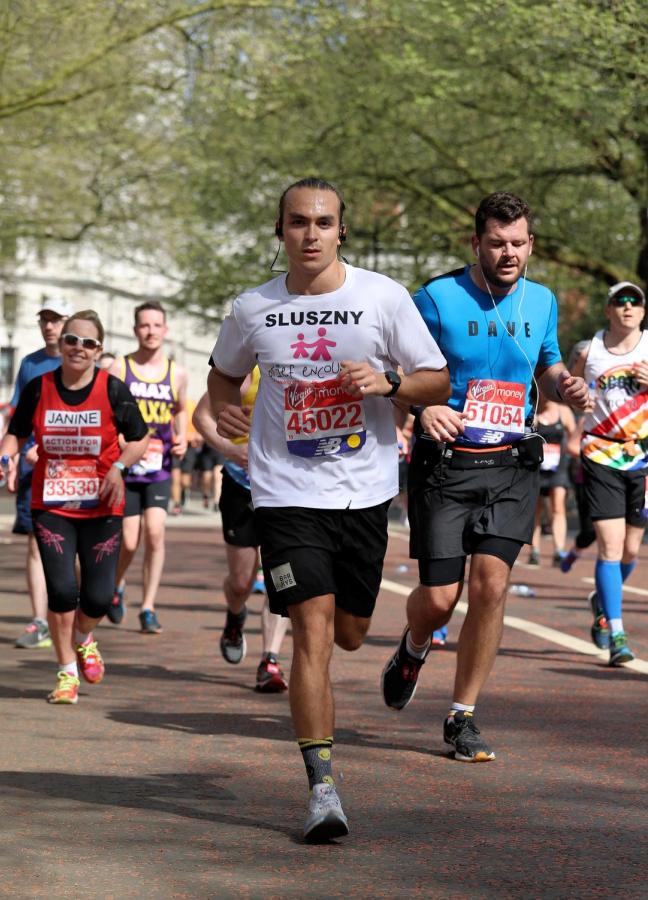

Words: Anna Galbraith
A record number of people applied to take part in London Marathon this year. And, whilst there are many who would literally sooner do anything than head out for “a light jog”, there is something undeniably alluring about being able to count yourself amongst that particularly elite club as Someone Who Ran A Marathon.
If you were lucky (or unfortunate) enough to score a place in the world’s most famous race this April, then you’re likely hotting up a gruelling training routine and regretting your life decisions. And, if you’re wondering how to use the remaining weeks to best effect, then look no further.
We asked Dr. Adam Collins, the Head of Nutrition at Form Nutrition and Barry’s Bootcamp master trainer David Sluszny, a Marathon runner himself, to give us their top tips for getting into your best shape ahead of the Big Day.
Some key advice...
“The first thing I would recommend would be going to a proper running shop and finding 2 or 3 pairs of shoes that suit you and which you can actually run in, says David. “It is a necessary expense to invest in more than one pair of shoes — trust me, shoes are made with limited mileage in mind!”
“I would recommend four shorter runs a week, with a long run typically scheduled for the weekend so that you have more time to devote to it. With a Marathon, you have to be a realist, you cannot think that because you have 6 months to prepare for it, you’ll be able to get a competitive time even though have you’ve never even run a 10K!”

David Jake Sluszny
“With extreme realism and complete accountability, you need to find yourself a rough pace from the outset that you think you’ll be able to hold consistently for 4 hours or more.
“When you run those four shorter runs in the week, you should run them at that pace or maybe even faster. I found it really effective on a 6 mile run, for example, to run miles 2, 4 and 6 at my Marathon pace, and mile 1, 3 and 5 at a slower pace.”
Your six week plan:
Here, David offers a failsafe template on how to map out the Final Countdown:
At six weeks out, you should be aiming to complete two 4 mile runs and two 6 mile runs in the week, with a long weekend run of around 12-14 miles.
With five weeks to go, you should stay with the short run distance, adding 4 miles onto the long run distance.
Four weeks away is when you should start to feel yourself peaking. The mid-week runs should be taken up to two 5 mile runs, and two 8-10 mile runs — with the long run needing to be taken up by another 4 miles (ideally, you’ll be approaching 18-20 miles by this point).
Try to make this long run a sort of dress rehearsal for the real thing — use your gels, your water and the shoes you want to wear on race day.

At three weeks out, you’ve reached your final week of proper training. Stick with two 5 mile runs and two 10 mile runs — but on the Sunday, aim to get your long run up to 22 miles at a maximum. Under no circumstances run the full distance before the actual Marathon, it’s not what your body is built for, and will do more harm than good.
With two weeks to go, definitely go back down to those 4 and 6 mile runs in the week — even if you only do three, that’s fine — then maybe try a long run of 15 miles if your body feels up to it. If you can, get a sports massage at some point this week.
One week out, do absolutely nothing! If you’re like me and simply cannot stay still, go for two or three really gentle runs just to get blood through your legs — but do not be outside, pushing yourself for too long.
Fuel your way to a personal best...
Alongside his title as Head of Nutrition at Form, Dr. Adam Collins is also a senior tutor in nutrition at the University of Surrey, having worked as a qualified nutritionist for nearly 20 years. Here, he shares the key ingredients to a champion runner’s diet plan:
Rule number one is to carb-load. As Dr. Adam Collins explains, elevating your glycogen stores can help decrease fatigue by upto 20% for an hour and a half. With this in mind, depending on the intensity & duration of your exercise, carbohydrates should account for at least 60% of your total energy. That’s a good excuse to chow down on a lot of pasta.
By the time you’re approaching the final three days prior to the race, aim to be eating 420-600g of carbohydrates, and ensure you have a packet of jelly babies in your pocket for the race itself.

A second key thing to remember is that protein is your friend. As a runner training for a Marathon, you’re going to need to incorporate a little more protein into your diet than the rest of the (sensible) population who are continuing about their normal lives. Dr. Collins recommends consuming 5g of BCAAs before exercise, in order to reduce delayed-onset muscle soreness.
And finally, drink up! Dehydration can cause metabolic dysregulation, heat intolerance and cardiovascular strain, but hyper-hydration can cause hyponatremia which can be fatal, explains Dr. Collins. To prevent under or over-hydration, his advice is to ‘drink to thirst’. “Isotonic drinks should be consumed before, during (every 20 minutes or according to thirst) and after the competition” he says.
A final vote of confidence...
“People definitely underestimate what a massive undertaking a Marathon is, which is why so many people fail or drop out last minute,” says David. “However, if you keep your head down and have an honest conversation with yourself about how you’re going to approach this challenge, then you’ll be fine. You have no one to impress but yourself!”

David’s three top tips:
Your body will change drastically and that’s fine, endurance athletes are not training for aesthetics they are training for performance.
Race day will not go to plan and that is fine, make sure you keep a level head and adapt. It’s never how good you are, it’s always how good you want to be.
Finally, have fun! Race day is when all your hard work comes to fruition. The actual day is a spectacle too great even for words, even though you don’t know all the supporters you feel on top of the world and as though they are just there for you — it really is a feeling like no other.
Now that you’ve got a training plan in place, stay on course with one of these fitness trackers…


